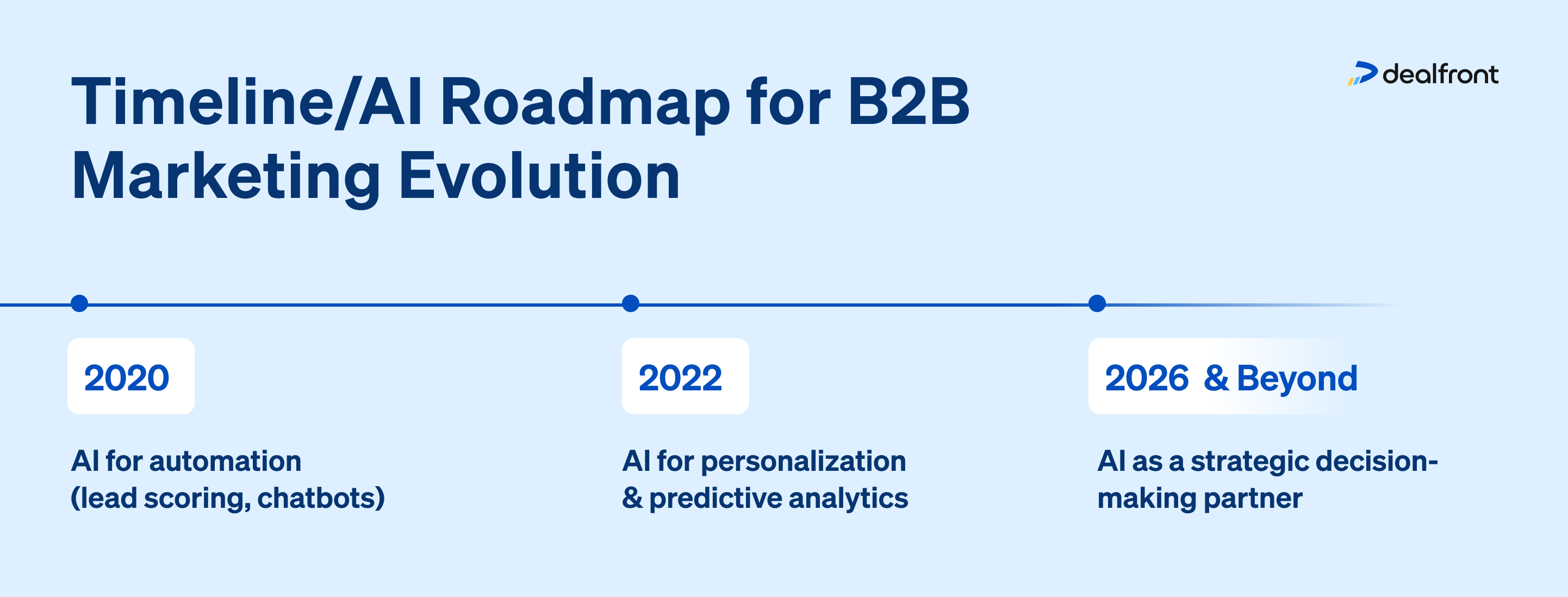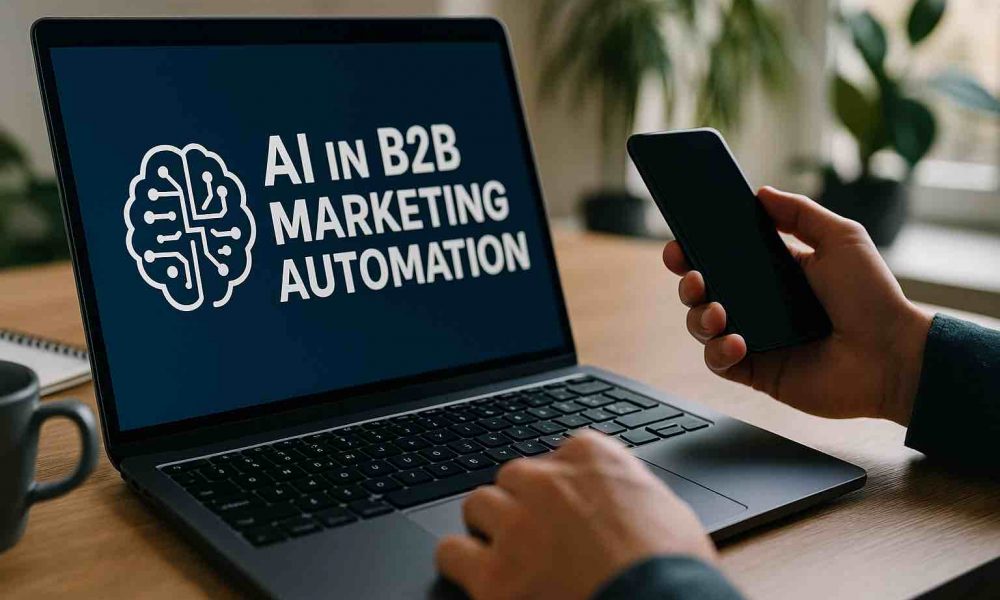How Growth Systems For B2B streamlines inventory management
Wiki Article
The Future of B2B: Using AI Automation to Drive Success
The landscape of B2B is moving as firms progressively turn to AI automation for calculated advantage. This improvement promises to improve efficiency and client involvement through innovative innovations. The combination of these devices is not without its challenges. Comprehending how businesses can navigate this advancing terrain will be vital for future success. What aspects will establish the effectiveness of AI in this field? The answers may redefine standard business models.Comprehending AI Automation in B2B
As organizations increasingly seek effectiveness, recognizing AI automation in B2B comes to be important. AI automation refers to using expert system technologies to enhance and boost company processes. In the B2B market, this includes the assimilation of AI devices to take care of jobs such as data analysis, customer interactions, and supply chain operations. By leveraging artificial intelligence and natural language processing, companies can improve accuracy, decrease human error, and speed up decision-making (Minarik AI). Additionally, AI automation assists in the handling of huge volumes of data, enabling companies to draw out beneficial understandings and optimize their operations. As organizations browse this technical landscape, an extensive understanding of AI automation's abilities will certainly equip them to stay responsive and competitive to market demandsSecret Benefits of AI Automation for Services
While lots of services come to grips with boosting functional demands, AI automation provides many benefits that can noticeably boost their efficiency. One considerable advantage is efficiency; AI systems can perform recurring jobs quicker and with better precision than humans, thus minimizing errors and freeing up employees for more tactical campaigns. In addition, AI automation allows data-driven decision-making by evaluating vast datasets promptly, supplying insights that educate service approaches. Expense reduction is an additional crucial benefit, as automation decreases labor expenses and optimizes source allowance. Moreover, AI can improve scalability, enabling services to adapt to market changes swiftly. Inevitably, the combination of AI automation cultivates advancement, enabling business to continue to be competitive in a rapidly evolving landscape.Changing Client Experiences With AI
AI is improving customer experiences by improving and allowing personalized interactions involvement. Through the application of anticipating analytics, businesses can expect consumer needs and preferences, leading to a lot more customized solutions. Additionally, enhancing assistance procedures with AI technology enhances effectiveness and complete satisfaction, eventually transforming the overall customer journey.Customized Communications and Engagement
Personalized interactions have come to be a keystone of effective customer engagement in the B2B landscape. By leveraging AI-driven services, services can customize their interaction and offerings to fulfill the unique needs of each client. Automated systems assess consumer choices, actions, and information, allowing companies to produce personalized experiences that resonate with their audience. This level of customization not just boosts client contentment but also cultivates lasting loyalty. Furthermore, AI tools facilitate real-time communications, enabling services to respond quickly and efficiently to inquiries and comments. As an outcome, business can build more powerful partnerships with clients, guaranteeing that their services straighten with advancing assumptions. Ultimately, personalized involvement with AI leads to boosted results and sustained success in the affordable B2B market.Predictive Analytics Implementation
As services increasingly look for to enhance client experiences, implementing predictive analytics has actually emerged as a pivotal method in the B2B sector. By leveraging data-driven insights, companies can anticipate client needs and preferences, allowing them to customize their offerings more properly. Anticipating analytics utilizes innovative algorithms and historical information to anticipate future behaviors, enabling organizations to identify potential difficulties and possibilities. This proactive method not just improves client satisfaction but likewise promotes commitment by supplying relevant and timely options. In addition, predictive analytics assists in resource allowance, making certain that advertising and marketing efforts are focused on high-value prospects. Ultimately, the combination of anticipating analytics furnishes B2B firms with the devices essential to change consumer communications and drive lasting success in a significantly affordable landscape.
Simplifying Assistance Procedures
Enhancing consumer experiences in the B2B field expands past anticipating analytics; enhancing assistance processes plays a crucial duty. By incorporating AI-driven remedies, organizations can automate regular questions and enhance response times, bring about enhanced consumer contentment. Chatbots and digital aides offer 24/7 support, addressing customer requires quickly and reducing the problem on human representatives. This automation enables teams to focus on intricate problems, fostering even more significant interactions. AI tools can assess support information to determine fads and areas for improvement, making sure continuous improvement of service top quality. As organizations embrace these modern technologies, they position themselves as customer-centric and responsive, inevitably driving commitment and company growth in an increasingly affordable landscape.Simplifying Workflow and Processes
Streamlining operations and procedures in B2B environments is crucial for improving total efficiency. By enhancing operations effectiveness and automating regular jobs, organizations can minimize manual errors and liberate valuable sources. This shift not just improves efficiency yet also allows groups to concentrate on strategic efforts that drive development.Maximizing Process Performance
Optimizing workflow effectiveness is crucial for businesses seeking to improve and minimize functional prices productivity. By evaluating existing processes, companies can determine bottlenecks and redundancies that impede efficiency. Implementing streamlined procedures enhances communication and collaboration among teams, guaranteeing that tasks are completed a lot more promptly. Utilizing data-driven insights enables companies to make informed choices that improve procedures better. In addition, taking on incorporated modern technologies can promote smooth details circulation, lessening the danger of delays and mistakes. As organizations accept these adjustments, they not just promote a much more nimble work environment yet additionally place themselves to respond quickly to market needs - AI Automation For B2B. Ultimately, concentrating on operations performance enables organizations to allot sources successfully, driving long-term success in an increasingly affordable landscapeAutomating Regular Tasks
Many companies are progressively turning to automation to take care of routine tasks, identifying its prospective to greatly boost operational efficiency. By releasing AI-driven services, firms can simplify repetitive tasks such as data access, invoice handling, and customer questions. This shift not just decreases human mistake however additionally liberates beneficial worker time, allowing personnel to focus on value-added tasks and calculated initiatives. Furthermore, automation can improve action times and solution consistency, bring about improved customer contentment. As companies browse a competitive landscape, leveraging automation for routine jobs becomes crucial for enhancing operations and maintaining dexterity. Ultimately, this technique cultivates development and drives development, placing companies for long-term success in the progressing B2B setting.Enhancing Decision-Making With Data Insights

Getting Rid Of Obstacles in AI Execution
AI implementation holds the guarantee of considerable operational improvements, organizations frequently deal with a myriad of difficulties that can hinder progress. Key barriers include data high quality problems, as many ventures deal with inconsistent or insufficient datasets needed for efficient AI training. Additionally, resistance to change within the labor force can restrain the fostering of AI innovations, as workers may fear task displacement or do not have the necessary abilities. Spending plan restrictions also present an obstacle, restricting investment in the required facilities and ability. In addition, incorporating AI systems with existing processes can be complex, requiring considerable time and resources. Getting rid of these challenges demands a calculated method that consists of thorough training, adjustment administration, and a dedication to constant improvement in AI efforts.Future Trends: The Following Frontier in B2B Automation
While the landscape of B2B automation remains to advance, emerging fads are poised to redefine just how organizations run. The integration of innovative synthetic knowledge will promote much more tailored client experiences, enabling services to customize services specifically to customer demands. Moreover, the increase of anticipating analytics will make it possible for organizations to anticipate market shifts and enhance decision-making procedures. Automation of routine jobs through robotic procedure automation (RPA) will improve effectiveness, minimizing functional expenses substantially. In addition, the fostering of blockchain modern technology guarantees improved transparency and safety in purchases. As these innovations gain grip, business will increasingly utilize AI-driven understandings to foster cooperation, enhance supply chains, and enhance total efficiency, noting a transformative shift in the B2B landscape.Frequently Asked Inquiries
What Sorts Of Companies Can Benefit Many From AI Automation?
Production, logistics, and customer care businesses can benefit most from AI automation. These fields improve operational efficiency, decrease prices, and enhance customer communications, inevitably resulting in raised performance and productivity in an open market.Just How Can Tiny Companies Carry Out AI Automation Properly?
Small companies can apply AI automation efficiently by identifying recurring jobs, choosing user-friendly devices, making certain ample training for employees, and slowly integrating options to optimize process while monitoring efficiency and adjusting techniques based upon responses.What Prevail Misunderstandings About AI in B2B?
Typical false impressions concerning AI in B2B consist of the idea that it is only for large business, that it guarantees immediate outcomes, which it can totally replace human decision-making rather than augmenting it. AI Automation For B2B.Exactly How Does AI Automation Effect Employee Responsibilities and Job Security?
AI automation improves employee functions by streamlining repeated tasks, promoting efficiency and advancement. While some fear task loss, it often produces chances for upskilling and brand-new positions, eventually enhancing task protection through included worth and productivity.What Abilities Are Required to Manage AI Automation Projects?

As companies significantly seek performance, understanding AI automation in B2B ends up being necessary. AI automation facilitates the handling of large volumes of information, making it possible for businesses to extract useful understandings and maximize their procedures. While many companies grapple with boosting operational demands, AI automation provides many advantages that can markedly enhance their performance. Automation of routine tasks with robotic process automation (RPA) will improve effectiveness, minimizing functional costs considerably. Manufacturing, logistics, and client solution businesses can benefit most from AI automation.
Report this wiki page